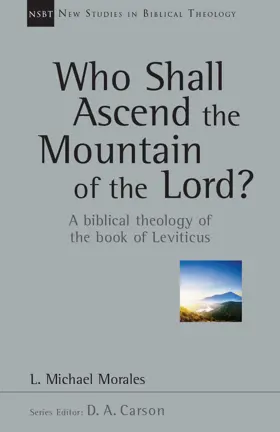

Who Shall Ascend the Mountain of the Lord? A Biblical Theology of the Book of Leviticus
in New Studies in Biblical Theology
Pages
320
Publisher
IVP Academic
Published
2016
ISBN-13
9780830826384
"Who shall ascend the mountain of the LORD?" —Psalm 24:3
In many ways, this is the fundamental question of Old Testament Israel’s cult—and, indeed, of life itself. How can creatures made from dust become members of God's household "forever"? The question of ascending God's mountain to his house was likely recited by pilgrims on approaching the temple on Mount Zion during the annual festivals. This entrance liturgy runs as an undercurrent throughout the Pentateuch and is at the heart of its central book, Leviticus. Its dominating concern, as well as that of the rest of the Bible, is the way in which humanity may come to dwell with God. Israel's deepest hope was not merely a liturgical question, but a historical quest.
Under the Mosaic covenant, the way opened up by God was through the Levitical cult of the tabernacle and later temple, its priesthood and rituals. The advent of Christ would open up a new and living way into the house of God—indeed, that was the goal of his taking our humanity upon himself, his suffering, his resurrection and ascension.
In this stimulating volume in the New Studies in Biblical Theology, Michael Morales explores the narrative context, literary structure and theology of Leviticus. He follows its dramatic movement, examines the tabernacle cult and the Day of Atonement, and tracks the development from Sinai’s tabernacle to Zion’s temple—and from the earthly to the heavenly Mount Zion in the New Testament. He shows how life with God in the house of God was the original goal of the creation of the cosmos, and became the goal of redemption and the new creation.
Addressing key issues in biblical theology, the works comprising New Studies in Biblical Theology are creative attempts to help Christians better understand their Bibles. The NSBT series is edited by D. A. Carson, aiming to simultaneously instruct and to edify, to interact with current scholarship and to point the way ahead.
In many ways, this is the fundamental question of Old Testament Israel’s cult—and, indeed, of life itself. How can creatures made from dust become members of God's household "forever"? The question of ascending God's mountain to his house was likely recited by pilgrims on approaching the temple on Mount Zion during the annual festivals. This entrance liturgy runs as an undercurrent throughout the Pentateuch and is at the heart of its central book, Leviticus. Its dominating concern, as well as that of the rest of the Bible, is the way in which humanity may come to dwell with God. Israel's deepest hope was not merely a liturgical question, but a historical quest.
Under the Mosaic covenant, the way opened up by God was through the Levitical cult of the tabernacle and later temple, its priesthood and rituals. The advent of Christ would open up a new and living way into the house of God—indeed, that was the goal of his taking our humanity upon himself, his suffering, his resurrection and ascension.
In this stimulating volume in the New Studies in Biblical Theology, Michael Morales explores the narrative context, literary structure and theology of Leviticus. He follows its dramatic movement, examines the tabernacle cult and the Day of Atonement, and tracks the development from Sinai’s tabernacle to Zion’s temple—and from the earthly to the heavenly Mount Zion in the New Testament. He shows how life with God in the house of God was the original goal of the creation of the cosmos, and became the goal of redemption and the new creation.
Addressing key issues in biblical theology, the works comprising New Studies in Biblical Theology are creative attempts to help Christians better understand their Bibles. The NSBT series is edited by D. A. Carson, aiming to simultaneously instruct and to edify, to interact with current scholarship and to point the way ahead.
Reviews
This is a must-read to understand the biblical-theological depths of this oft-neglected book. This will grant a deep understanding of Leviticus in the canon of Scripture, particularly in the theology of the Pentateuch.
This is a must-read to understand the biblical-theological depths of this oft-neglected book. This will grant a deep understanding of Leviticus in the canon of Scripture, particularly in the theology of the Pentateuch.
Wow. It seems that everything Morales writes is ... major. This book and his newer book, 'Exodus: old and new', are fantastic. I've learned so much from both of them.
Who shall ascend the mountain stretches the Canon showing the significance of Leviticus and its system throughout. Beginning at creation, Morales argues that the seventh day was the climax of creation rather than the 6th where man was made, the idea that the telos of creation was the sabbath communion. This is somewhat the beginning of the whole thesis as Morales moves throughout the Bible showing the support of this goal from start to finish. God and man as one flesh. Leviticus really comes to life with Morales' expert and illuminating touch. The sacrifices have never made more since, nor the structure and purpose of Leviticus. Morales gives a theological and exegetical reading of the pentateuch before broadening his scope to the rest of the Bible in the last 100 pages or so. How Christ brings it all to its proper understanding and fulfillment covers the last 50 pages and is just overflowing with goodies of golden thought. It's not an easy book and the chapters are hefty, but this is simply a must read for any serious theological student of the faith.
